In hot and humid areas, AC units can become essential to our ability to function on some of the hotter days. The efficiency of your AC system depends on a number of factors, some of which are more difficult to control. But an easy way to improve efficiency is to adjust the vents.
Let’s look at the science behind which direction your AC vents should point, and then we will move on to other ways by which you can improve the efficiency of your AC system.

As a general rule, AC vents should point upward (but not enough to narrow the openings too much). This allows cold air to displace hot air before sinking. An exception is when the vents are located on the walls right below the ceiling. Here, vents must point parallel to the ceiling or slightly down.
AC Vents Should Point Upwards
Although there are no specific indications for the direction in which your air vents must point, in order to maintain efficient airflow, it is best to direct your AC vent upwards. But why is this the case?
Well, as we know, hot air rises, and cold air sinks. If you were to point your AC vents downwards, the air at the bottom of the room would always be cool, but the air at the top of the room will always be relatively warm.
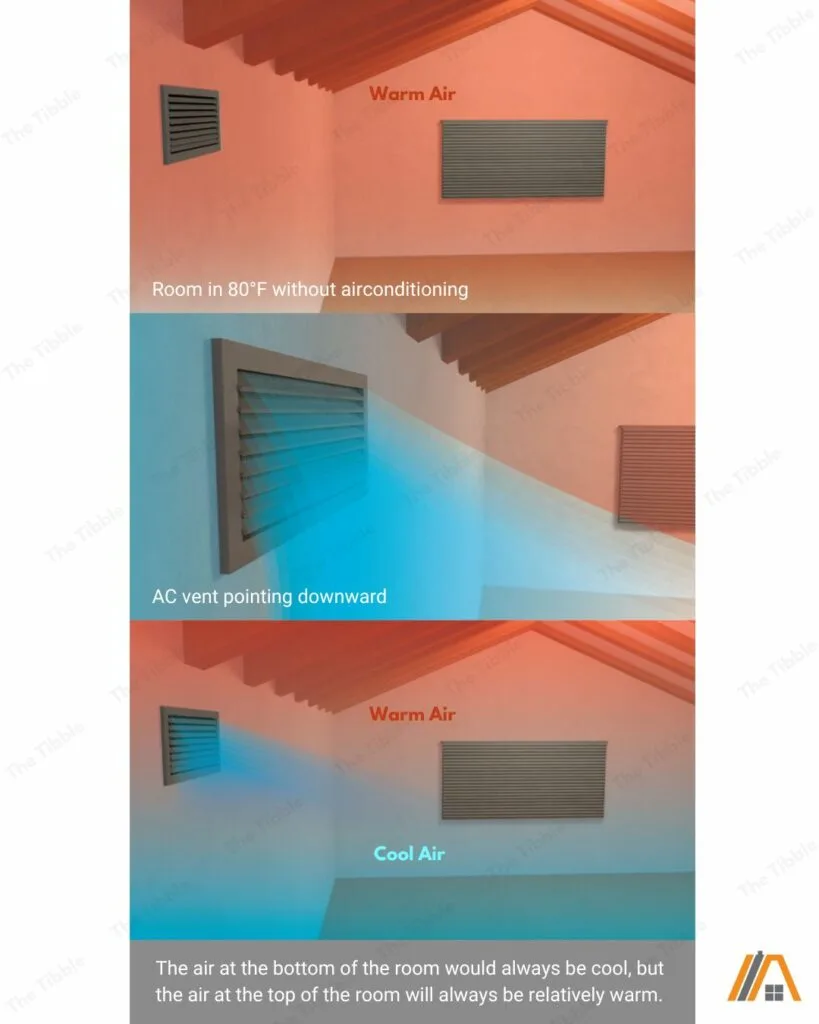
Furthermore, the flow of air, which is also important to a feeling of coolness, will be poor in a room with the AC vents pointing downward.
This is because the warm air will never be displaced or will only be displaced very slowly. The cold air in the lower half of the room will flow but will trap the warm air above.
When you point your vents upward, the expelling force of the AC pushes cold air into the top part of the room, displacing or cooling (through the transfer of thermal energy down the temperature gradient) the warm air here.
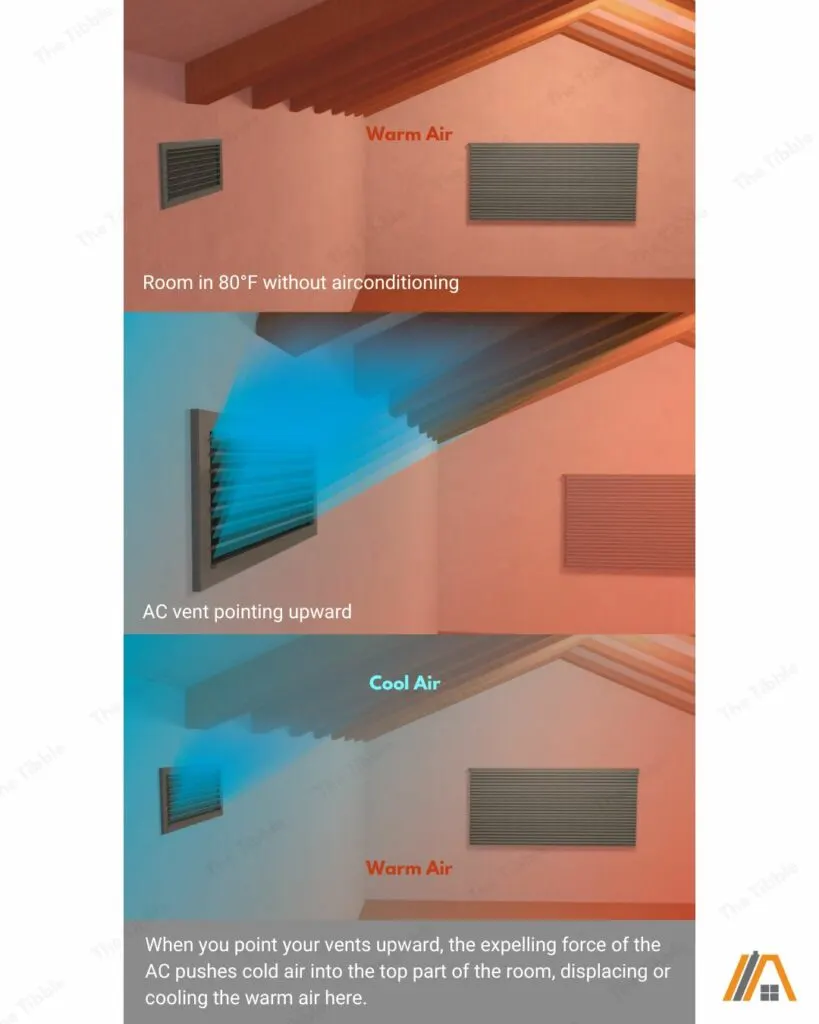
This cool air will then sink and create airflow, which leads to a more even distribution of the cool air in the room.
Another benefit to having your AC vents pointing upwards is that you won’t have the cold air blowing directly onto you, which can become uncomfortable fast, even in warm weather.
Don’t Compromise the Opening Size
Although pointing the air vents upwards is generally suggested for optimal airflow and cooling, adjusting them too far upwards can actually be counterproductive.
If the openings of the vents are made too narrow, less space is left for the air to travel through, thereby canceling out the intended purpose of increasing the AC’s efficiency.
By constricting the air’s pathway, you’re at risk of having a high electric bill plus a room that is too hot and uncomfortable.
So, make sure that the upward angle at which you are pointing the vents allows the openings to be large enough to allow for sufficient air to flow into the room so that you can avoid a sweat!
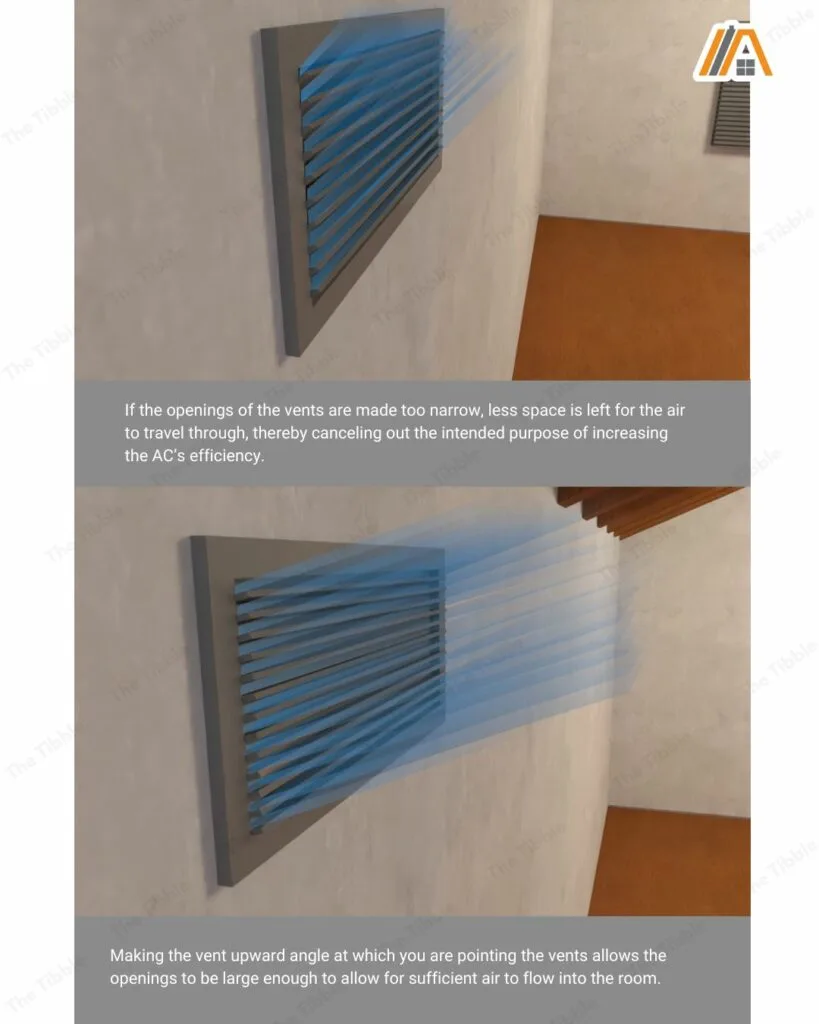
What About Vents Near the Ceiling?
Vents placed underneath the ceiling are a great location for conditioning the air.
However, when your vents are installed just beneath the ceiling, angling them upwards means that the air will merely bounce off of the ceiling before it can efficiently disperse throughout the room.
In such cases, angling them so that they point parallel to the ceiling or slightly downwards ensures that the cool air will circulate suitably, reaching the people in the room.
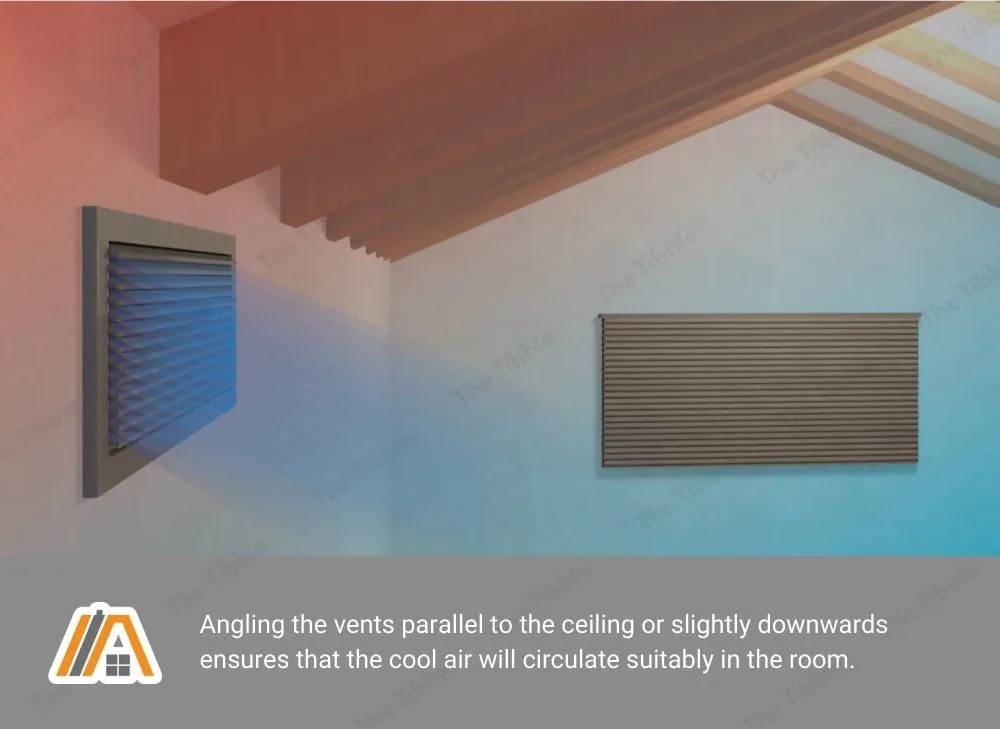
Point Them Down to Target a Specific Spot
Sometimes the heat gets too unbearable, and you want to aim the AC vents right at you while you sleep or exercise or just recover from the oppressive heat.
You can definitely do so for short periods of time. However, pointing the AC directly at you and at a very low temperature has been known to bring on headaches, fatigue, and joint pain.
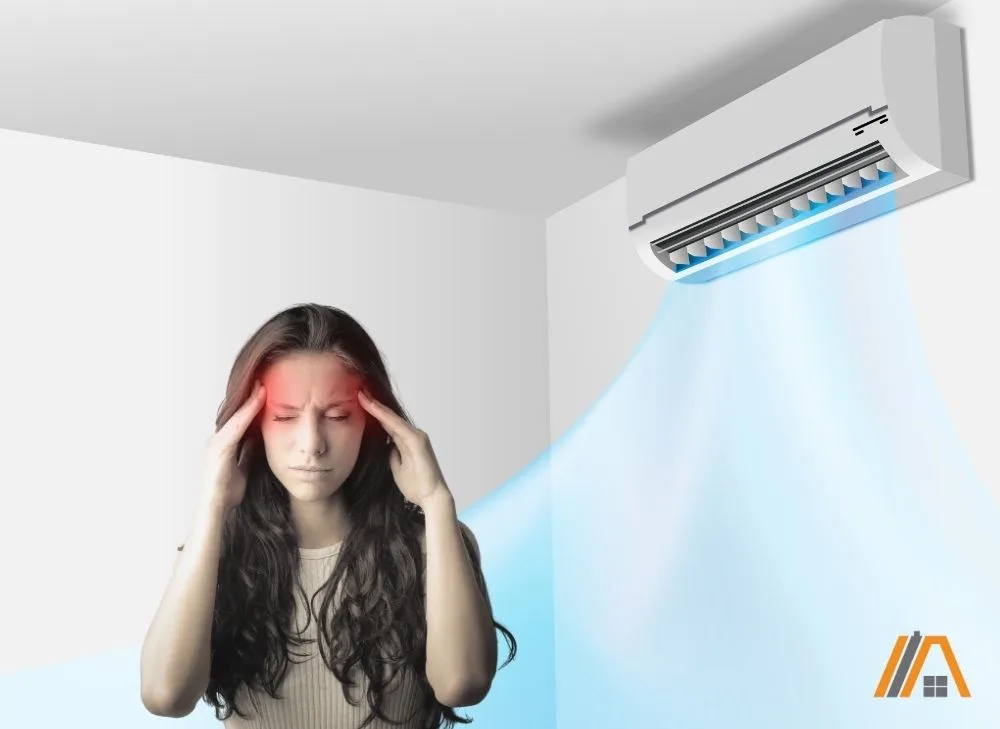
Although experts have deemed it safe to sleep with the AC on, it is important for the temperature to not be too cold as this.
Furthermore, the lack of moisture in the air can cause difficulty breathing and may bring on a cold, although this is not necessarily a direct cause and effect situation.
Rather, switch on the AC in your bedroom an hour before you go to bed, turning it off when you are ready to sleep. The room will be cool and comfortable, and you won’t have to worry about getting sick.
Is It Bad for AC Vents to Point Towards Windows?
It may seem pointless to direct your AC vent towards your windows, but positioning them this way is actually known to increase air circulation.
By pointing them towards your windows and walls, not only are you avoiding having cold air blowing directly onto you, you are allowing the air to create a current that allows for the air to flow efficiently throughout the room.
Having a fully functional AC unit makes for a cool and comfortable home. However, if it is not working as it should, it can be more frustrating than if you had no AC system at all.
Let’s look at some tips for making your AC work at its best.
Further Tips for Improving the Efficacy of Your AC
- Ensure the outdoor unit is always clean. Either do it yourself (see below video) or hire a professional for in-depth cleaning.
If you’re going to attempt the clean yourself, you’ll probably need an Air Conditioner Condenser Fin Comb (amazon link) and a coil cleaner like the Nu-Calgon Evap Foam No Rinse Evaporator Coil Cleaner (amazon link).
- Keep your vents clean by vacuuming up any dirt that may have accumulated. Dust particles block the vents, decreasing airflow out of them.
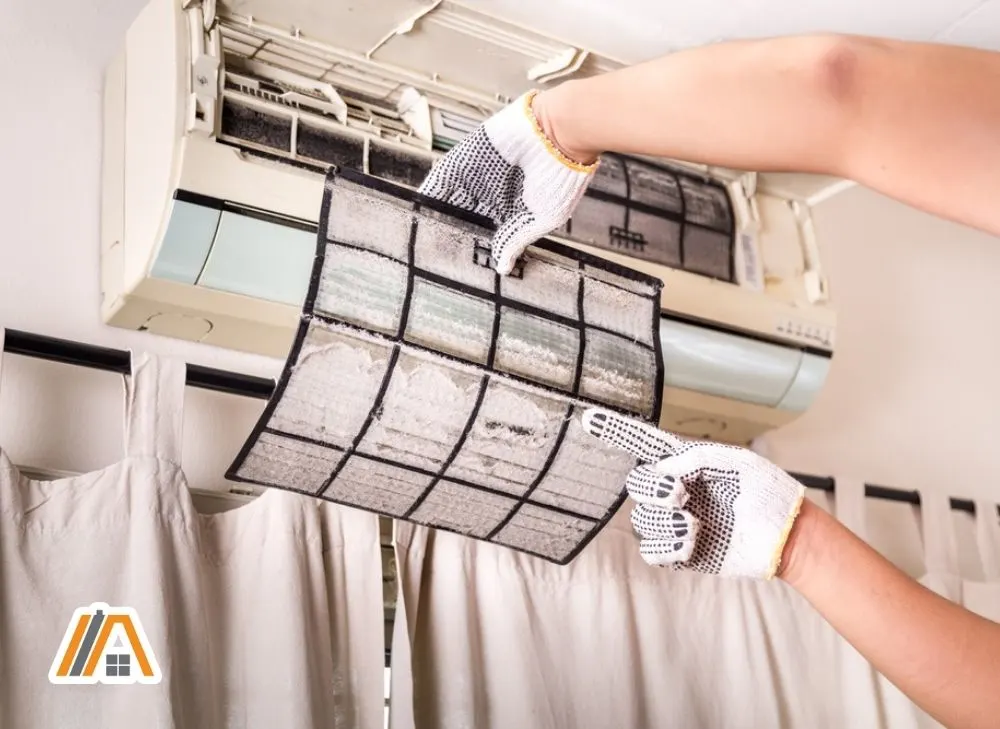
- Plan your room layout effectively. Avoid blocking the airflow of your AC by ensuring nothing is positioned directly in front of it.
- As far as possible, close your curtains while the AC is running as the heat entering through the windows will cause your AC to work overtime.
- Avoid installing your AC unit near a window that receives a lot of light and heat during the day. The AC won’t be able to detect the actual room temperature. It will work based on the concentrated heat from direct sunlight. The same goes for lamps or other heat-emitting appliances near your AC.
Note: You do get window AC units, which will have to be installed in the windows.
- Place your AC unit away from direct sunlight, i.e., not directly across from a window. This will reduce the strain on the equipment, allowing for optimal performance.
- Glaze your windows. This allows the glass of the window on the inside of the house to remain at room temperature. Thus, less heat is transmitted through the window and into the house, ensuring your AC does not run harder than it needs to.
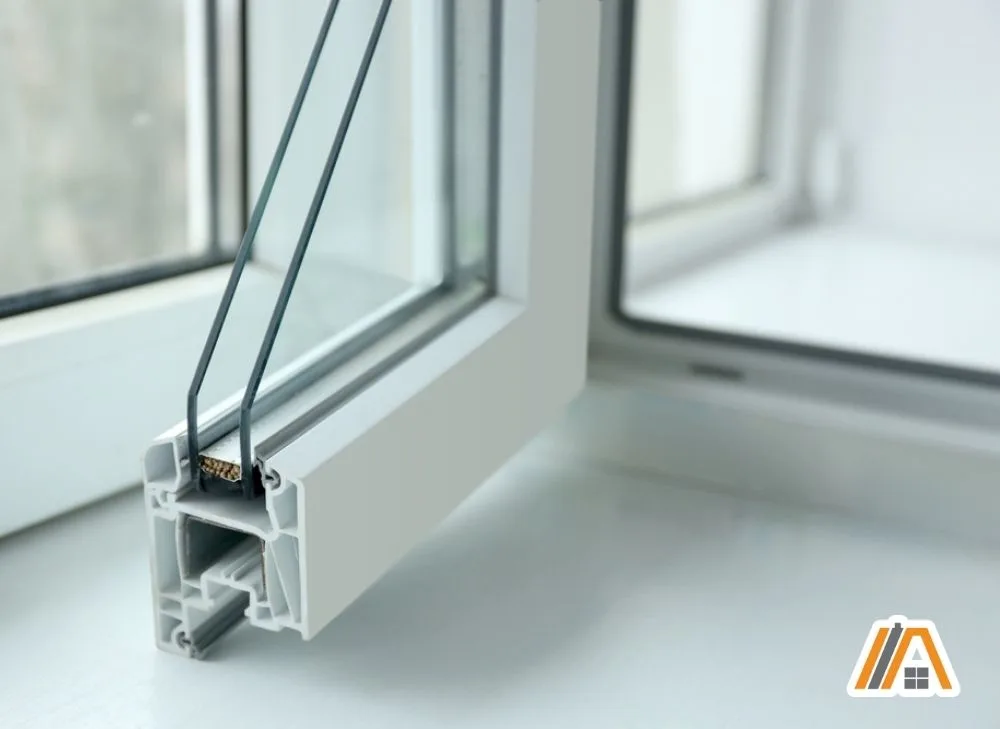
- Keep the doors and windows closed when the AC is on. This will prevent any of the conditioned air from escaping, which may reduce the efficiency of the airflow.
- Check if your AC needs to be recharged.
Sources
https://www.centralhtg.com/blog/8-no-cost-ways-to-improve-air-conditioning-efficiency
https://pm.on.ca/what-is-the-purpose-of-glazing-windows/
https://www.hunker.com/13415700/how-do-i-set-vents-to-maximize-air-conditioner
https://hartmanbrothers.com/blog/difference-floor-vs-ceiling-heat-ducts
https://mooreheating.com/air-conditioning-can-make-you-sick-heres-how-to-avoid-it/
